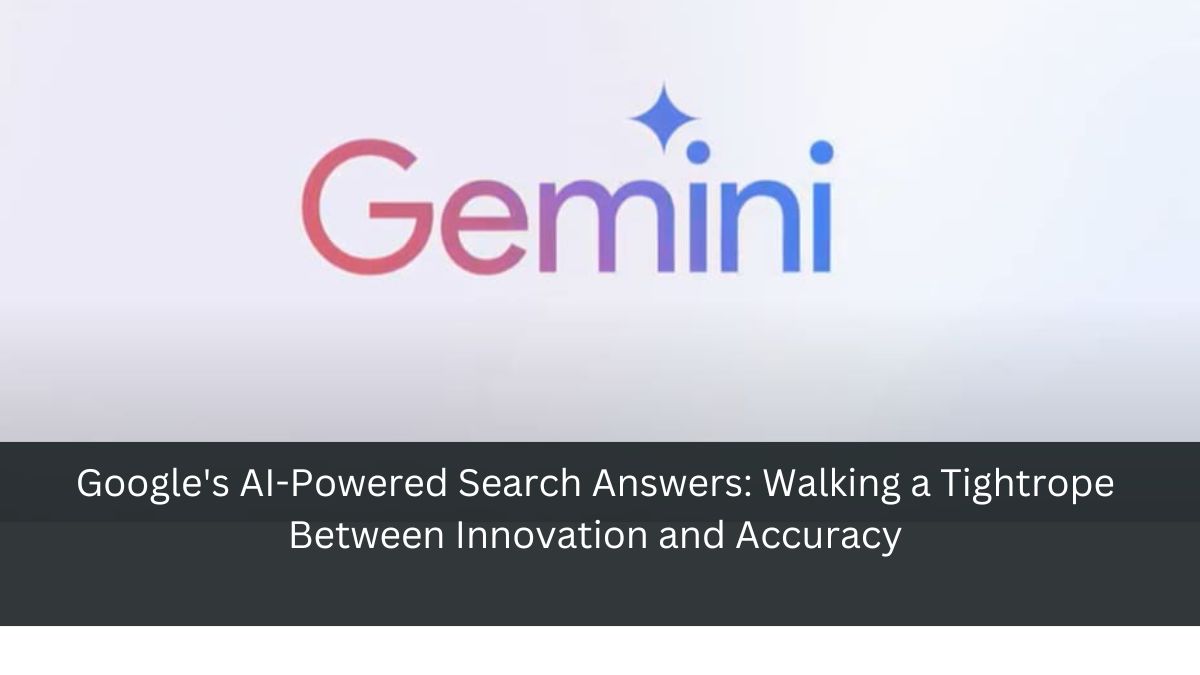AI
Google’s AI-Powered Search Answers: Walking a Tightrope Between Innovation and Accuracy

Introduction
Google, the undisputed king of search engines, has recently found itself grappling with an unexpected challenge: providing accurate AI-generated answers to user queries. The tech giant’s latest foray into the world of artificial intelligence has been met with a mix of excitement and skepticism, as users uncover instances of comically bad or even potentially dangerous responses. This article delves into Google’s ongoing struggle to strike a balance between pushing the boundaries of AI-powered search and maintaining the trust of its billions of users worldwide.
The Allure of AI-Generated Answers
In an era where instant gratification reigns supreme, the prospect of receiving direct answers to search queries, rather than sifting through a list of links, is undeniably appealing. Google’s AI Overview feature aims to revolutionize the search experience by summarizing the content of relevant websites and presenting users with a concise, easily digestible response. The potential benefits are clear: faster access to information, reduced cognitive load, and a more streamlined search process.
However, as the old adage goes, “with great power comes great responsibility.” And in the case of AI-generated answers, the responsibility falls squarely on Google’s shoulders.
The Pitfalls of Relying on AI
As impressive as artificial intelligence may be, it is not infallible. The internet is a vast repository of information, but not all of it is accurate, up-to-date, or even safe. When Google’s AI algorithms attempt to summarize and synthesize this information, there is always the risk of propagating misinformation, promoting harmful practices, or simply providing nonsensical answers.
Take, for example, the now-infamous instance of Google suggesting that people stare into the sun for 5 to 15 minutes, with darker-skinned individuals advised to do so for even longer. Such a response is not only absurd but also potentially dangerous, as prolonged exposure to the sun’s rays can cause serious eye damage.
The Human Cost of AI Errors
While it’s easy to laugh off some of the more ridiculous AI-generated answers, the consequences of Google’s missteps can be far from humorous. Imagine a scenario where a user, trusting in Google’s authority, follows a misguided AI-generated recommendation and suffers harm as a result. The damage to Google’s reputation and the erosion of user trust could be catastrophic.
As Katie Notopoulos, a journalist who bravely ate a pizza made with glue based on a Google AI suggestion, aptly put it, “It’s the difference between me handing you a map and me giving you directions that will send your car barreling over a cliff.”
Google’s Response and the Road Ahead
Faced with mounting criticism and the specter of losing its search dominance, Google has been quick to downplay the severity of the issue. The company argues that the vast majority of AI-generated answers are of high quality and that the problematic responses are few and far between. Google also claims to be actively monitoring and swiftly addressing any inappropriate or harmful answers that surface.
However, the question remains: can Google truly keep pace with the sheer volume of queries and the potential for AI to generate misleading or dangerous responses? As more users become aware of the flaws in Google’s AI-powered search, the pressure on the company to deliver consistently accurate and reliable answers will only intensify.
Conclusion
Google’s journey into the realm of AI-generated search answers is a testament to the company’s unwavering commitment to innovation and its desire to stay ahead of the curve in an increasingly competitive landscape. However, as the recent controversies have shown, the path to AI-powered search is fraught with challenges and potential pitfalls.
As Google continues to refine its algorithms and grapple with the complexities of AI-generated content, it must remain vigilant in its efforts to maintain user trust and provide accurate, reliable information. The future of search may well lie in the hands of artificial intelligence, but it is up to Google to ensure that this future is one where users can confidently rely on the answers they receive, without fear of being led astray or exposed to harm.
